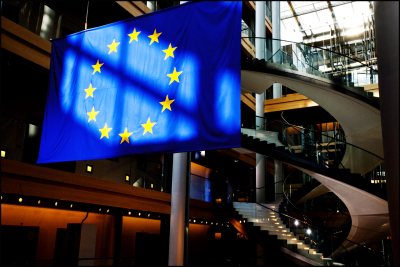This is the first edition of a new web series from Transparency International EU on tech lobbying in Brussels.
To start off, we have analysed the 4,342 lobby meetings the Commission has published in their two digital portfolios. We see three broad trends emerging from the data over the last four years. First, digital issues attract by far the most attention from lobbyists. Second, lobbying on digital issues has the strongest imbalance towards corporate lobbying of any portfolio. And third, there is a distinct dominance from large corporations that are increasingly coming from outside the EU, particularly from Silicon Valley.
The regulations of the Internet is the #1 lobbying issue in Brussels
Taken together, the digital single market and digital economy portfolios represent 18% of all lobby meetings published by the European Commission since November 2014. Influencing digital transformation is a top priority for lobbyists in Brussels as this far exceeds any other portfolios.
Graph 1: Share of meetings per portfolio since November 2014
Digital lobbying is dominated by corporates
As for the balance between types of actors, our analysis shows that digital issues have some of the highest concentration of corporate lobbying of all portfolios. Despite numerous calls from civil society including ourselves, this imbalance has remained largely unchanged. From November 2014 until November 2018, roughly 82% of high-level lobby meetings have been with organisations representing corporate interests (companies or industry associations). Whereas other portfolios manage a much more balanced composition of the stakeholders they consult.
Graph 2: Concentration of corporate lobby meetings by policy area
Even though civil society’s share has slightly improved over time, starting at 7% and rising to 10%, stakeholder consultation in digital policies largely remains the domain of large companies & groups. This is in stark contrast with portfolios such as environment, education and better regulation, where top officials in charge have taken note of President Juncker’s call to “ensure an appropriate balance and representativeness in stakeholder consultation”.
Table 3: Share by type of organisation in digital policy per year of publication
In most policy areas the European associations (industry or others) dominate the lobbying landscape. This makes sense, as its much easier to meet with the car industry association say, instead of meeting each car maker individually. In the area of digital policy, however, individual companies continue to play a dominating role. Out of the 20 organisations with most meetings, only four are trade associations.
This fact is emphasised by looking at the top 20 organisations with the most lobby meetings on digital policies, which is entirely dominated by large companies and groups. There is not a single SME, or SME-focused business association represented, and NGOs are absent from the top with the exception of BEUC (the European consumer protection organisation). Instead lobbying is dominated by large companies: Google, Vodafone, Microsoft, Facebook, Snap.
Digital policy is dominated by Silicon Valley
As is evident from that list, it is non-EU companies in particular that are lobbying the most. In the last four years, their share rose from 25% to 50% of the top 20 with a clear lead taken by Silicon Valley companies such as Facebook, Google and Amazon. Part of the reason lies in the lack of a major EU tech giant emerging in the last years. Only the Swedish online music platform Spotify makes it to the top 20. Another reason might be European companies’ preference to lobby at national level.
It is also a questions of means. Lobby spending by big tech companies, including Silicon Valley companies has tripled in the last four years. They are also particularly keen in hiring through the revolving door – something we will take a closer look at in the next edition of this series.
With numerous proposals still in the pipeline to complete the digital single market, we can expect big tech’s dominance to continue if not expand during the next legislature. This study is a stark reminder that in the absence of clearly defined rules, it rests upon the Commissioners and their staff to enforce a balanced consultation with lobbyists whether they represent SMEs, Silicon Valley companies, NGOs or other stakeholders.
Table 4: top 20 most influential tech lobby organisations in the last year of publication






